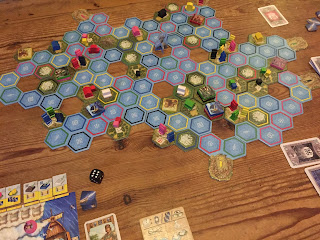That finally changed yesterday when we sat down to play it at six o'clock. With an eye on the clock I reduced the 12 tasks to a jaunty 8, and we were away!
Unlike most/all of Feld's other games, this isn't a point salad, but a race. Like most/all his other games though, it does involve a lot of moving parts.
We are mortals hoping to join Zeus in his apartment in the heavens, and the first to complete the twelve tasks and return to him will be the outright winner. The tasks consist of four things - building shrines, erecting statues, delivering offerings to temples, and defeating monsters (three of each example in the full game). The modular board can be set up any way you like, as long as all the water is connected.
In front of you is your player mat, where you keep track of your tasks and your other Feldian attributes - oracle cards, companion cards, equipment, standing with the Gods, and in particular your oracle dice. This are the nub of the game, as on your turn you roll, and decide how to spend them. Any dice can be used to pick up favour tokens (helpful die-or-movement-manipulators) or improve your standing with the Gods, but the juicer actions require the right colour roll: moving your ship around the water, loading/unloading it, exploring islands (need the right location for your shrine!) or battling monsters all need a matching die colour.
Whenever you complete a task, there is a reward: companion cards can help boost the speed of your ship or improve your combat level v monsters, for instance. When you boost a God marker to the heavens on your player board, they will reward you with a one-off special move: Poseidon will sail you instantly to any water spot on the board, whereas Aphrodite allows you to discard all your injury cards.
Oh yes, injuries! One cannot undertake a perilous quest such as this without taking some scratches, and every round the Titan attacks. If you haven't bumped up your shields sufficiently, you take a hit in the form of injuries. Six injuries (or three of a matching colour) mean you have to skip a turn to recover.
temples, monsters, statues
Fighting monsters also involves a die-roll. A monster's strength is always nine, and you minus your shield strength from it before rolling a d10 and hoping to beat whatever number it is. This is where my game fell apart, as having spotted Stanley only had three tasks left to complete, I elected to tick my monster tasks off and proceeded to roll a series of 1s, 2s, and 3s as Stan sailed serenely around the board to finish off his business. By the time he returned to Zeus to claim his prize, I was raging at the dying of the light/rolling of the d10 - and no longer feeling clever.
All in all then, a very typical Feld in some ways (moving parts) but others (racing, battling) distinguishing it from the likes of Burgundy or Macao. It took me back a few years to when those sorts of games felt very new, so I wouldn't say it was groundbreaking or fresh. But I really enjoyed it.




Nice write up Sam. Sounds a wee bit like El Dorado without the deck-building?
ReplyDeleteIn the sense it’s a race. And you there’s some screwage too - for blocking in El Dorado read nicking stuff from under other players’ noses here. Similarly tactical too rather than overly strategic.
ReplyDelete